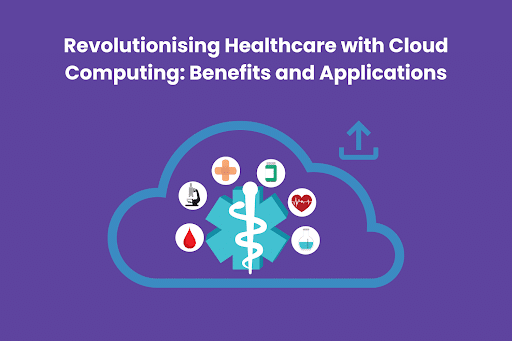Revolutionising Healthcare with Cloud Computing: Benefits and Applications
The healthcare industry is undergoing a transformative revolution fueled by the integration of Cloud Computing. The convergence of healthcare and cloud technology is proving to be a game-changer, offering unprecedented opportunities to enhance patient care, streamline operations, and drive innovation. In this blog, we’ll explore the profound impact of Cloud Computing in Healthcare, delving into its benefits and diverse applications that are reshaping the landscape of medical services.
Table of Contents
- Cloud Computing in Healthcare: An Overview
- Key Benefits of Cloud Computing in Healthcare
- Applications of Cloud Computing in Healthcare
- Conclusion
Cloud Computing in Healthcare: An Overview
The medical field is one of cloud computing’s most ardent supporters. This paradigm shifts the delivery of computer services to the Internet. The storage and management of patient data was formerly handled by healthcare facilities using on-premises servers and regional systems. Nevertheless, this strategy had several drawbacks, such as the high infrastructure costs, restricted scalability, and certain security risks.
A new age of accessibility, efficiency, and cooperation has begun in healthcare with the introduction of cloud computing. Using cloud-based solutions, Healthcare practitioners may safely store, manage, and access massive volumes of patient data in the digital domain. As a result of this change, healthcare providers can work together in real time, which improves both the efficiency and effectiveness of patient treatment.
Key Benefits of Cloud Computing in Healthcare
These are the Key Benefits of Cloud Computing in Healthcare:
Enhanced Data Security: Cloud computing offers advanced security features, including encryption, authentication, and access controls, ensuring the confidentiality and integrity of sensitive patient information. Healthcare organisations often can’t match the level of protection cloud service providers offer. A safer setting for handling and archiving medical records is the end effect of this.
Scalability and Flexibility: Healthcare needs are dynamic, with fluctuations in patient volumes and data requirements. Thanks to cloud computing’s exceptional scalability, healthcare providers may increase or decrease their resources according to demand. Organisations can easily adjust to new situations because of this adaptability, eliminating the need to spend much on infrastructure.
Cost Efficiency: Traditional on-premises infrastructure demands significant upfront investments and ongoing maintenance costs. Healthcare organisations may take advantage of cloud computing’s pay-as-you-go concept and only pay for the resources they utilise. Thanks to this method, smaller healthcare providers may affordably have access to state-of-the-art equipment and services.
Interoperability and Collaboration: Cloud-based systems facilitate seamless data sharing and interoperability among healthcare providers. The healthcare ecosystem is becoming more interconnected and integrated due to this interoperability, which improves cooperation across healthcare institutions such as hospitals and clinics. Better care coordination and faster decision-making are both made possible by having real-time access to patient data.
Innovative Healthcare Solutions: Cloud computing serves as a catalyst for innovation in healthcare. The capacity to tap into robust computing resources allows healthcare professionals to use AI and ML to sift through massive datasets for diagnosis, treatment planning, and predictive analytics. This paves the way for novel approaches to optimising treatments and personalised medicine.
Applications of Cloud Computing in Healthcare
Here we explore the Applications of Cloud Computing in Healthcare:
Electronic Health Records (EHRs): The shift from paper to electronic health records relies heavily on cloud computing. Healthcare operations are made more efficient with the help of electronic health record systems stored on the cloud, which offer a centralised and easily available repository of patient information. Better decisions can be made since authorised healthcare personnel can access patient data from anywhere.
Telemedicine and Remote Patient Monitoring: The rise of telemedicine has been accelerated by cloud computing. Using cloud-based technologies, healthcare practitioners may securely exchange medical information, remotely monitor patients, and conduct virtual consultations. Patients with chronic diseases may be monitored continuously, allowing for proactive and preventative therapy, and healthcare access is expanded.
Healthcare Analytics: Cloud computing empowers healthcare organizations to harness the power of data analytics for insights into patient outcomes, resource utilization, and operational efficiency. Decisions based on facts and efforts to enhance performance can be aided by analysing huge databases on the cloud for trends, patterns, and correlations.
Medical Imaging and Diagnostics: Storing and processing medical imaging data, such as X-rays, MRIs, and CT scans, require substantial computational resources. Cloud-based technologies provide a scalable platform for effectively managing and analysing massive picture databases. This not only helps experts and radiologists work together more efficiently, but it also speeds up the diagnosis process.
Conclusion
The marriage of healthcare and cloud computing is reshaping the industry, offering many benefits and opening avenues for unprecedented advancements. The cloud has revolutionized healthcare delivery in many ways, including increased data security and interoperability, the availability of novel healthcare technologies, and more. Cloud computing is more than just a technical tool; it is a catalyst for a healthier and more connected future as we commemorate the first anniversary of this revolutionary journey.
Explore in-depth insights and gain hands-on expertise in the realm of cloud computing with our comprehensive Cloud Computing Courses. Stay ahead of the curve and contribute to the transformative journey of healthcare and technology integration. Enroll now and be part of the future of innovation and progress.”



Comments are closed.